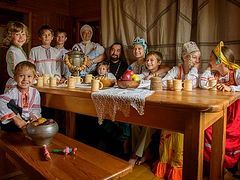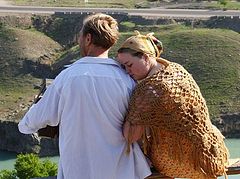In a patriarchal society, preparation for family life was something well-established. For example, 100 years ago, in a Russian village, families had many children. Children were gradually introduced into adulthood, taught to help with the chores, and the older children served as nannies for the younger ones. The way of life was built so that children grew up gradually, becoming independent. Here is the key point: It is precisely independence that distinguishes a child from an adult.
Of course, on certain issues, peasant children who reached the age of maturity remained dependent, and in the important issue of choosing a bride, the decision was made by the parents. There’s no need to idealize the patriarchal family—it had its own advantages and disadvantages. And anyways, the absolute majority of families are not patriarchal now, and a return to the past is impossible.
Therefore, let’s move closer to our days. Already in the 1950s, the Orthodox author Sergei Fudel pointed out to his son the danger that distorts the life of young people:
Flaunting yourself for two hours at a picnic somewhere is one thing, but to live together for twenty years, in everyday life and illnesses is quite another. Recently, a friend of mine … a doctor of science, told me seriously that he only recognizes arranged marriages. It is true that before entering into marriage there should be some consideration, some adult calculation of how, in light of your and her characters and qualities, to correctly build a life… I don’t think a marriage “out of passion” would be happy in the end… It is terrible if there is not enough love; that is, if its charge lasts only two hours, not for twenty years.1
You see, Sergei Fudel no longer considered arranged marriage a reality of his times. On the other hand, he considered marriage for passion, out of precocious infatuation, to be doomed to misery. What is needed for familial happiness? You need maturity, an adult mind—to contemplate how the bride and groom with their characters will live together for twenty years, not two hours. And, of course, it requires an ascetic struggle for happiness. Here, festive amorousness is not enough—you need love and maturity to persist through everyday life and illness, preserving and multiplying the joy.
Teenage years
In our days, we observe an unhealthy process of growing up: First children are encouraged to progress more quickly into the category of teenagers (this traumatizes and incapacitates children), and then the brakes are put on, and teenagers aren’t allowed to become adults (they are prevented from developing). “Sexual Education,” vulgar teenager music, and ostentatious stereotypical behavior that mimics adults are imposed upon eight-year-old children in droves. Teenagers are easier to manipulate.
Of course, it is not just the lower stratum of mass culture that is to blame for driving people into adolescence. We’ve all seen how a single mother raises a son “for herself.” A son lives with his mother for thirty years; he can’t cook for himself, he has no wife and kids. In the 1980s, adolescence was considered to be from about twelve to eighteen years. Now it’s more difficult: Nine-year-old children act like adults, while forty-year-old men abandon their wives and children, justifying their sin with adolescent frivolity. How can we explain to them what a man’s responsibility is for a family?
This is a purely ascetic task—to answer for your actions. The repentant memory of the Dread Judgment helps us with this. Some believe that repentance removes a man’s responsibility for evil deeds and words. On the contrary, true repentance cultivates a sense of responsibility within us. Repentance helps us become adults, and not just seem like adults—a teenager swears, gulps beer, and on this basis feels like a man. People develop an inclination towards being an “eternally young” teenager.
It’s hard for our children to grow up now—it requires a real podvig of maturing—they have to swim against the current. Let’s help them. Without growing up, a man cannot open up, start a family, and lead the people entrusted to him by God.
Archpriest Theodore Borodin formulated this more concretely:
“If a child has learned, let’s say, without being reminded, to look after and be responsible for taking out the trash himself, then, when he grows up, he’ll be able to handle any task”—he will start a strong family and will be able to manage the enterprise.2 That’s how it is.
It's a great work to help children, gradually habituating them towards an independent life, distributing responsibilities around the house; so that the son clearly knows that he takes out the trash. Gradually teach him to attend to himself and fulfill his set of responsibilities for the entire family; so that he gets used to thinking about preparing lunch, buying clothes, and making money; planning and implementing, like an adult.
Work and hobbies
Each of us has a talent from God. A person’s bright talent can be seen even in children’s games. They say that Sasha Suvorov played soldiers so intricately that a family friend, noticing the boy’s talent in the game, ask his father to think about military service for Sasha. The result was a brilliant commander, a valiant warrior, and a defender of Russia.
Children’s games grow into hobbies. One child goes to a drawing club, another is interested in model airplanes, a third runs off to do freestyle wrestling. These hobbies may raise questions about the child’s future profession. One child may do well at math in school, but not literature. It means he has a mathematical mindset, and perhaps this young mathematician will work as a programmer. Of course, he’ll have to study hard for years. Serious study is asceticism for a child, no doubt.
In the nineteenth century, work was quite clear and stable: You learned your trade and went to work like your grandfathers, taking a position suitable for your social standing. Industrial revolutions and other societal events have changed our lives. The twenty-first century forces us to study in college, to continue our studies at the work place, and to relearn our jobs after five years. We acquire knowledge and skills in one profession and then we have to switch to other skills or a second profession.
Orthodox thinker and trade expert Nassim Nicholas Taleb divides modern professions into two large groups:
-
In Centralistan, there are the professions of the “middle people,” with nothing out of the ordinary. So, a man studies dentistry, he works, and will have a normal, stable income, but will never get rich.
-
In Extremistan live the traders and writers, where studies and work give no stable result. The winner takes it all and the losers live as paupers. Who turns out the winner depends on the so-called “black swan,” that is, on an unpredictable event that entails great consequences. In the modern world, we see a mass outflow of people to Extremistan.
The business community highly appreciated Taleb’s books The Black Swan, Antifragile, and Skin in the Game. Taleb’s books are about how a man can live in the modern world with its risks and uncertainty, using this uncertainty as a chance to strengthen his positions. In his books, he relies on knowledge of the law of the American economy and the foundations of European culture, on his daily experience, historical examples, and—most importantly for us!—on the Gospel, on Orthodox Tradition. It’s a pity that the Russian translations of Taleb’s religious component are extremely poorly rendered. For Taleb, reflections about work and the spiritual life are inseparable.
Separating work from hobbies/volunteering is another ascetic task for maturing teenagers. What I’m interested in, what I like to do, might not be very necessary for people—meaning it doesn’t bring any money. Or another option: It’s in demand in society, but I can’t do it very well—I can’t survive a competition with professionals. What then? Let it be my hobby, not my profession. We have to come to terms with it and find a suitable job, without giving up our favorite activity, dong it in our leisure time.
There are two extremes associated with work. The first extreme is lazy parasitism: “My mom made me go to college. I got a degree. There’s no good work in this field,” although you’re counting on mama feeding you. Such a passive attitude to life—infantile, unworthy of an adult, incompatible with starting a family—often ends in a catastrophe.
The second extreme is unhealthy careerism: “Living from paycheck to paycheck isn’t for me. I have to work smarter. Good work is when you work less for more and aren’t responsible for anything.” They want to take the social elevator to the top floor with such an attitude. They don’t want to climb the social ladder, going up every rung, but want to immediately find themselves in the right shaft, press the button and fly off to the clouds. There are many dirty ways to rise to the top: “eat” the competition, or get married for money. You won’t find any happiness in “cannibalism” and a fictitious marriage.
 Sergei Fudel with his wife and son Work implies conscientious, skilled labor; we have to sacrifice something for work.3 Work can be boring. To work through the boredom and other difficulties is asceticism; a penance from God given to fallen Adam. Sergei Fudel told his son:
Sergei Fudel with his wife and son Work implies conscientious, skilled labor; we have to sacrifice something for work.3 Work can be boring. To work through the boredom and other difficulties is asceticism; a penance from God given to fallen Adam. Sergei Fudel told his son:
“It’s not work that is terrible, but nonsense in work. But I advise you not to be discouraged in this; that is, amidst the nonsense, look for a path of your own.”4
He who seeks will find.
Higher than work is service (military, priestly, medical). It requires more than the usual work from a man—readiness to sacrifice yourself in a necessary moment, to give up your life. Let’s think about the fate of the apostle Paul. He studied under Gamaliel, a scholar of the Holy Scriptures, and earned his living making tents—a simply physical labor. Meanwhile, Christ called him to the apostolic ministry, to the podvig of martyrdom. The apostle’s fate included service and work. For other people, it’s work and hobbies; or two jobs (for earnings and for the soul).
And people who have left the world continue to labor. St. Benedict of Nursia called upon monks: “Ora et labora,” that is, “Pray and work.” These are the two activities that create the rhythm of life for all Christians.
Marriage
There’s a widespread reluctance to start a real family among young people today. The family is supplanted by lawless cohabitation, slyly calling it “civil marriage.” They hold cunning conversations about how the marriage license is just a formality. I want to ask: “Then is your birth certificate also a formality? Then you don’t need official documentation at all? And money is also just a formality? Then don’t use legal documents and money; go back to the prehistoric era.”
This is all adolescent guile. Mature people don’t enter into a surrogate “civil marriage.” They don’t take responsibility for their actions, so they come up with excuses… My “husband” doesn’t want to go to the civil registry office. My “wife” is having an abortion. These are all ascetic problems. Avoiding responsibility for their actions, people find sweet-sounding names for them. Instead of “fornication,” they say, “civil marriage.” The sin of infanticide is referred to with the neutral word “abortion.”
An important aspect of preparing for family life is avoiding any surrogates for the marriage bed and preserving yourself until marriage. This is especially difficult now. The sex industry has made “virginity” a dirty word and stolen the original noble sound of the word. But amongst our people, losing your virginity before marriage was traditionally understood as “losing yourself.”
It is difficult for those who had relations before marriage to preserve marital fidelity. They don’t have that one person for life: They had one relationship, then marriage; in principle, a third relationship is possible. And marital infidelity—a treacherous, terrible blow—destroys even strong families.
Elder John (Krestiankin) spoke well about marital relations:
“Carnal love is one of the components of marriage; it is blessed in the Sacrament of Marriage, and it is a sin for anyone to dare to malign marriage. God has blessed two paths to salvation: marriage and monasticism, and both are ways of the Cross.”5
The podvig of growing up involves not only the teenager who is growing up, but much depends on the parents here. The podvig of the parents is to help their children grow up:
“Prepare children for their future family life from an early age, so surging feelings don’t pull the rug out from under the feet of the young person. A mother should speak with her daughters, while it is more convenient for a father to rear his sons.”6
One of the criteria for growing up is that a teenager’s attitude to his parents change for the better. The well-known teenage misunderstanding and rejection of parents melts away. The love he had for his parents in childhood is renewed. But now this love is no longer childish, but adult—mature, grown-up!




